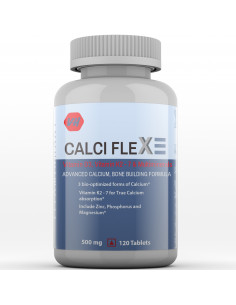- Supplement
- 1 likes
- 1521 views
Calcium is an essential mineral that is required by the body for a variety of functions, including the development and maintenance of strong bones and teeth, muscle function, nerve transmission, and blood clotting. While calcium is widely available in foods such as dairy products, leafy greens, and fortified cereals, many people do not consume enough calcium through their diet and may need to supplement their intake with calcium tablets. In this comprehensive guide, we will explore how calcium tablets can help maximize your health potential.
Why Do You Need Calcium?
Calcium is crucial for building and maintaining strong bones and teeth. It also plays a vital role in muscle function, nerve transmission, and blood clotting. Calcium deficiency can lead to a variety of health problems, including osteoporosis, muscle cramps, and heart problems.
How Much Calcium Do You Need?
The amount of calcium you need depends on your age and sex. According to the National Institutes of Health, the recommended daily intake of calcium for adults is 1,000-1,200 milligrams per day. Women over the age of 50 and men over the age of 70 need slightly more, with a recommended daily intake of 1,200-1,500 milligrams per day.
Benefits of Calcium Tablets
- Preventing Osteoporosis: Osteoporosis is a condition in which bones become weak and brittle, increasing the risk of fractures. Calcium is a crucial nutrient for maintaining strong bones, and calcium supplements can help prevent osteoporosis. According to a systematic review and meta-analysis of randomized controlled trials, calcium supplements are effective in reducing the risk of bone loss and fractures in older adults.
- Enhancing Athletic Performance: Calcium is important for muscle function and contraction, making it a potential supplement for enhancing athletic performance. A study published in the Journal of Sports Science and Medicine found that calcium supplementation improved muscle strength and anaerobic power in male athletes.
- Reducing PMS Symptoms: Premenstrual syndrome (PMS) is a group of symptoms that occur in women before their period, including mood changes, cramps, and bloating. Calcium supplements may help alleviate some of these symptoms. A study published in the Journal of Women’s Health found that calcium supplementation reduced the severity of PMS symptoms in women.
- Reducing Blood Pressure: High blood pressure is a common health problem that can increase the risk of heart disease and stroke. Calcium supplements may help reduce blood pressure in people with hypertension. A meta-analysis of randomized controlled trials found that calcium supplementation reduced systolic blood pressure by an average of 2.6 mmHg and diastolic blood pressure by an average of 1.3 mmHg in people with hypertension.
- Improving Dental Health: Calcium is essential for strong teeth, and calcium supplements may help improve dental health. A study published in the Journal of Periodontology found that calcium supplementation improved tooth attachment and reduced gum inflammation in people with periodontitis, a condition in which the gums become inflamed and can lead to tooth loss.
How to Choose a Calcium Supplement When choosing a calcium supplement, it is important to consider the type of calcium used in the supplement. Calcium carbonate and calcium citrate are the most common forms of calcium used in supplements. Calcium carbonate is cheaper and more widely available, but it needs to be taken with food to be absorbed properly. Calcium citrate can be taken on an empty stomach, but it is more expensive.
It is also important to consider the amount of elemental calcium in the supplement. The amount of elemental calcium is the actual amount of calcium that your body can absorb. For example, a supplement containing 500 milligrams of calcium carbonate actually contains only 200 milligrams of elemental calcium.
In summary, calcium supplements can provide a variety of health benefits and may be beneficial for those who do not get enough calcium through their diet. However, it is important to take the appropriate dosage and to speak with a healthcare provider before starting any new supplement regimen.
References :-
- National Institutes of Health. Calcium. https://ods.od.nih.gov/factsheets/Calcium-HealthProfessional/
- Reid IR, Bolland MJ, Grey A. Calcium supplements and osteoporosis. BMJ. 2015;351:h4183.
- Koundourakis NE, Androulakis NE, Malliaraki N, et al. Discrepancy between Exercise Performance, Body Composition, and Sex Steroid Response after a Six-Week Detraining Period Accompanied by Vitamin D Supplementation. Nutrients. 2017;9(9):964.
- Thys-Jacobs S, Starkey P, Bernstein D, Tian J. Calcium carbonate and the premenstrual syndrome: effects on premenstrual and menstrual symptoms. Premenstrual Syndrome Study Group. Am J Obstet Gynecol. 1998;179(2):444-452.
- Dickinson HO, Nicolson DJ, Cook JV, et al. Calcium supplementation for the management of primary hypertension in adults. Cochrane Database Syst Rev. 2006;(2):CD004639.
- Hujoel PP, Bollen AM, Noonan CJ, Del Aguila MA. Antepartum calcium supplementation and periodontal disease. J Periodontol. 2005;76(11 Suppl):2090-2096.





